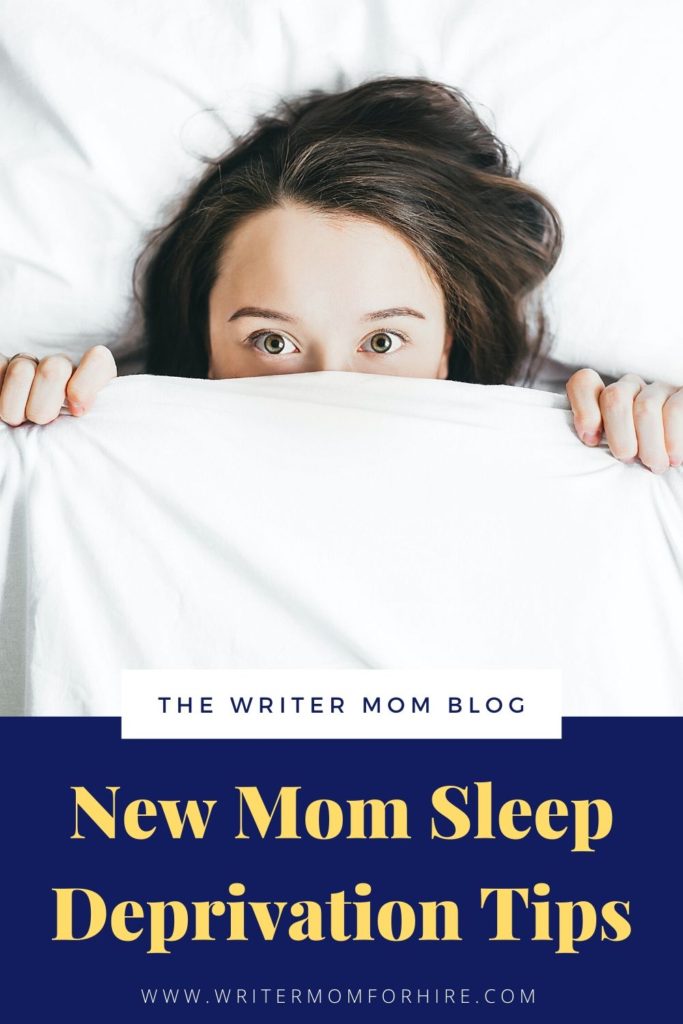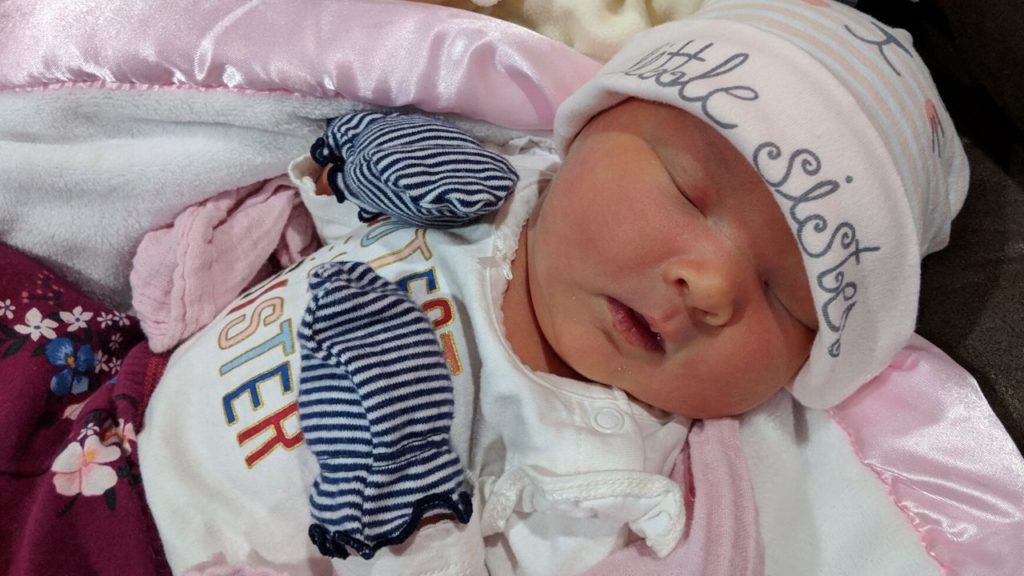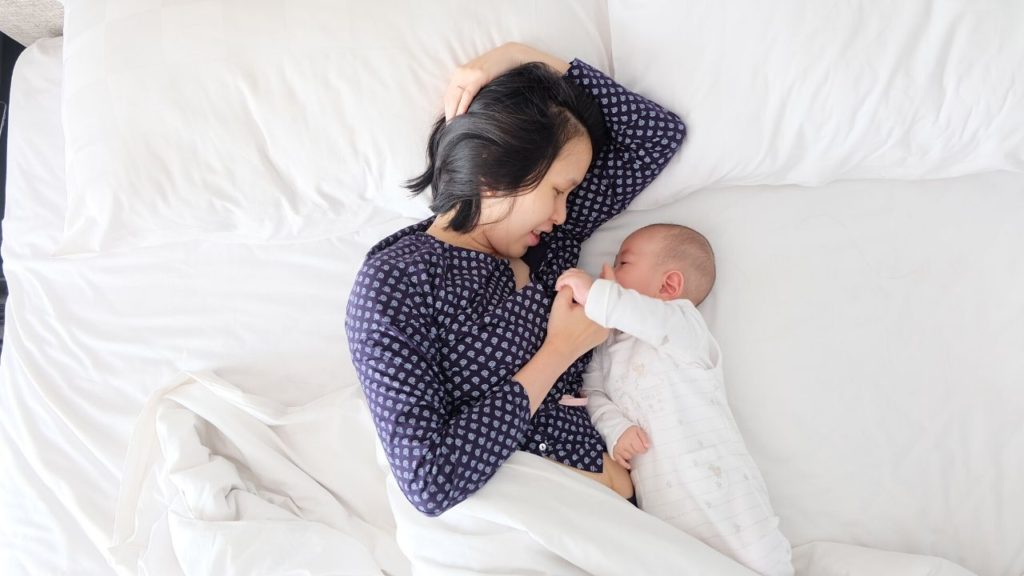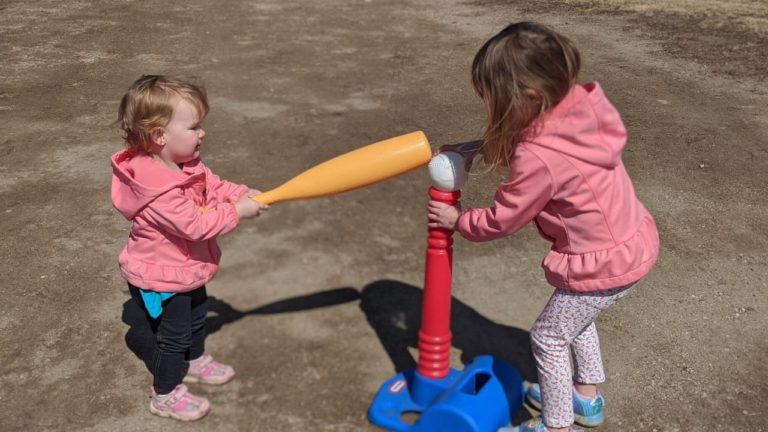10 Tips to Survive New Mom Sleep Deprivation
This post may contain affiliate links and we may earn commissions when you make a purchase through these links (at no extra cost to you). See our disclosure policy for more details.
Tips for Coping With Sleep Deprivation When You Have a Newborn
You just had a baby (congratulations!), and you’ve suddenly been thrown into the realm of new mom sleep deprivation.
Sleep deprivation when you have a newborn is no joke. Your baby is crying, you’re crying, and you’re wondering…how can I get more sleep?!
Remember, this time is fleeting. Baby will eventually start to sleep for longer periods of time and you’ll start to feel (a little) more rested.
That said, you’re exhausted from postpartum new parent sleep deprivation and need help right now.
Let’s start out by discussing a few of the effects of sleep deprivation on new moms and dads, and then we’ll go over a list of ways to manage sleep deprivation when you have a newborn.
Sleep deprivation when you have a newborn is no joke. Your baby is crying, you're crying, and you're wondering...how can I get more sleep?!Click To Tweet

But first: Do you want to feel like you’re sleeping on a cloud and get the best night of sleep in your life?
Click here to start a 101-night sleep trial on a Puffy mattress
Effects of Sleep Deprivation on New Moms
These are just seven of the many possible effects of new parent sleep deprivation.

Photo by Alexandra Gorn on Unsplash
1. Sleep deprivation can affect your mood.
Studies have shown that postpartum sleep deprivation can affect your mood, causing irritability, short-temperedness, and vulnerability to stress (source).
The good news is that, once the new mom sleep deprivation period ends, your mood should return to normal.
2. Losing out on sleep could shorten your life expectancy.
Sleep is essential for physical and mental well-being and is one of the most important factors responsible for the maintenance of a healthy organism, thus representing a homeostatic need required for life (source).
The good news is that new parent sleep deprivation is usually short-lived, so as your child gets older, your quality of sleep should improve.
However, the stress of raising kids could very likely impact your sleep quality down the road, so it’s important to do what you can to improve your sleep hygiene from the beginning.
3. You’re more likely to get into a car accident when sleep deprived.
The National Highway Traffic Safety Administration estimates that drowsy driving was responsible for 72,000 crashes, 44,000 injuries, and 800 deaths in 2013.
However, these numbers are underestimated, and up to 6,000 fatal crashes each year may be caused by drowsy drivers (source).
Who is most likely to drive drowsy? Drivers who don’t get enough sleep.
And when you’re a new parent, you likely aren’t getting enough sleep, meaning you’re at increased odds of driving drowsy and getting into a car accident.
4. Being sleep deprived means being less productive.
Have you ever walked into a room, only to forget why you’re there?
Mom Brain is very real for many of us. While there could be a number of factors at play, sleep deprivation can certainly play a role in forgetfulness.
And when you can’t remember what you’re supposed to be doing, it’s hard to be productive.
5. Memory impairment from sleep deprivation can impact your parenting skills.
As parents, we don’t want to make costly mistakes while caring for our children. The more sleep deprived we become, the more likely we are to forget things that could impact the wellbeing of our children.
6. Less sleep equals more weight gain.
If you lost your baby weight immediately after birth, consider yourself lucky!
Many of us have a hard time losing pregnancy weight after giving birth, and being sleep deprived only makes it harder. Research suggests that there’s an association between sleep restriction and changes in metabolism.
Compared to sleeping ten hours a night, sleeping only four hours a night can increase hunger and appetite (especially when it comes to calorie-dense foods that are high in carbohydrates).
7. Your immune system suffers when you don’t get enough sleep.
Research shows that those of us who don’t get enough rest are more vulnerable to catching a cold or other common illnesses. And when you have a new baby to care for, you want to feel your best.
Of course, you want to avoid spreading illness to your new baby, too.
How to Manage Sleep Deprivation When You Have a Newborn
Now that we know why new mom sleep deprivation isn’t healthy, let’s cover some ways to manage sleep deprivation when you have a new baby.
After all, you’re here because you are wondering: “How can I get enough sleep with my newborn?”
Below are some tips for getting more sleep when you have a newborn, plus ways you can feel more rested on the days when you haven’t gotten enough sleep.

1. Utilize the hospital nursery.
If you’re anything like me, you probably have trouble sleeping immediately after having a new baby. Neither of my babies would sleep in the hospital bassinets, and my husband needed to rest, too.
While many hospitals today encourage “rooming in”, there’s nothing wrong with letting the nurses help out while you catch up on much-needed sleep.
Don’t worry — they will bring your baby back when it’s time for feeding.
Also, make sure to let hospital staff know that you aren’t accepting visitors while you’re resting. Most hospitals are very accommodating in this regard.
2. Make sleep a priority
Sleep whenever you can. Easier said than done, though, right?
In the days and weeks after having a new baby, make sleep a priority. Especially if you’re waking frequently during the night.
There’s nothing wrong with taking a quick catnap during the day so you can avoid new mom sleep deprivation.
If you have trouble falling asleep, a white noise machine could help both yourself and your baby fall asleep more easily.
Too bright in your bedroom? Try blackout curtains to block out excess light. Do whatever you need to get some shut-eye when you have the opportunity.
3. Choose the right mattress.
As a new parent, you’re probably not sleeping for long periods of time, so when you when you do sleep, it’s crucial that you’re getting the best quality sleep possible.
If you wake up tossing and turning because you can’t get comfortable, you might be due for a new mattress.
If you wake up aching every morning, you might be due for a new mattress.
If you can’t remember the last time you replaced your mattress, you might be due for a new mattress.
Want to feel like you’re sleeping on a cloud?
Puffy Mattress is one of the top chiropractor-recommended mattresses, and it was designed for everyone (no matter your sleep position) to get the best night of sleep you’ve ever had.
4. Reconsider your nighttime sleeping arrangement.
When your newborn is close to you, you’ll be able to hear right away when he or she wakes up, and hopefully you’ll be able to keep baby from waking fully.
This will make it much easier to get your baby back to sleep.
However, we have to do whatever works to get a good night’s sleep. For some, that means putting baby in a different room, while others can’t sleep without their baby right next to them.
Whatever you choose, remember — you’re doing a great job.
The only thing that has worked for us was to practice safe bedsharing, which I’ll cover in my next point….
5. Learn about safe “breastsleeping” if you’re a breastfeeding mom.
While it may be controversial, bedsharing with our babies — and breastfeeding in bed — is the only way we’ve gotten any sleep and kept our sanity.
However, that doesn’t mean it’s a safe option for everyone.
There are a few safety guidelines you need to follow if you choose to bedshare and “breastsleep”, and it’s important that you follow the Safe Seven while doing so.
Safe Seven checklist:
- You are a nonsmoker.
- You’re sober and unimpaired.
- You are a breastfeeding mother.
- Your baby is healthy and full-term.
- You place baby on his back.
- Your baby is lightly dressed.
- You are both on a safe surface.
If you follow the Safe Seven, then your baby in bed with you is at no greater risk for SIDS than if he’s nearby in a crib.
And if you sleep in the “cuddle curl” position, it’s virtually impossible to roll on top of your baby (source).

Photo by kevin liang on Unsplash
6. Turn off devices an hour or two before bedtime.
The blue light that is emitted from our devices — television, cell phones, etc. — sends signals to our bodies to stop producing melatonin, which is a hormone that helps us sleep at night.
Too much blue light exposure disrupts our sleep cycles and wreaks havoc on our body’s internal clock.
That’s why all the experts recommend turning off all devices an hour or two before bedtime. I know, that’s easier said than done…
I don’t know about you, but when I’m nursing my baby back to sleep, the first thing I do is pick up my phone, even though I know I shouldn’t.
If you just can’t put it down before bedtime, you could always pick up a pair of blue light glasses to help block out those blue light waves while you scroll through your Facebook feed.
7. Limit caffeine consumption.
Coffee is the new mom’s best friend. However, drinking coffee — or anything with caffeine — too late in the day can disrupt sleep at night.
If you find yourself having a trouble sleeping, try cutting yourself off from caffeine after 3 PM. If you’re still not getting good quality sleep, you might need to cut it out even earlier.
8. Take turns on the night shift.
Since I exclusively breastfed both of my babies, this didn’t work for us, but it might work for you if your baby takes bottles at night.
Split the nighttime hours evenly between yourself and your partner. One of you gets up with the baby between 9 PM and 2 AM, and the other gets the 2 AM to 7 AM shift.
(Obviously, adjust the timeframe to whatever works best in your situation.)
9. Accept help when it’s available.
Unfortunately, a lot of new moms don’t have much help after having a baby. If you are a single parent, or your partner is working outside the home, you are probably pretty exhausted from trying to do it all.
After having our second baby, my husband went back to work after a couple days, and I was left at home with a newborn and a toddler.
I learned that every little bit helps, whether someone is offering to bring food over, clean your house, or watch the toddler while you and the baby take a nap.
10. Let the housework wait.
It can be tempting to fold laundry or wash the dishes while baby naps, but the housework can wait. If you’re experiencing postpartum sleep deprivation, and you don’t have other children to keep an eye on, take a nap with your baby.
Once you’re a little more rested, and baby is content, you can chip away at the housework.
Concluding Thoughts on New Mom Sleep Deprivation
In this article, we discovered seven of the impacts of sleep deprivation on new moms.
We also went over ten ways to manage sleep deprivation when you have a newborn, such as reconsidering your sleeping arrangement and choosing the right mattress.
Thankfully, the newborn stage doesn’t last forever (as much as we love snuggling brand-new babies!). As baby starts to sleep for longer stretches of time, hopefully you will be able to sleep longer, as well.
However, it’s important to rest up after having a baby, not only to help your body heal after birth, but so you can make the most of every moment with your new baby.
Related:
Get a Better Night’s Sleep on a Puffy Mattress
Top 21 Gift Ideas for New Moms Who are Coffee Lovers
Review | Ultimate Puffy Mattress Buying Guide








I just got a new mattress and I can’t believe the difference in my sleep and my recovery. I didn’t think it was that big of a deal until we switched. Hopefully my extra rest will help me take off the extra few pounds I’ve put on too!
We followed the Safe Seven and wow did it make a difference!!! Letting the housework wait is something that is huge in our home!
I believe it! It helped me get so much more sleep after my second daughter was born.
It’s amazing how much better you can sleep in a good quality mattress!
Oh, how I wish I had this knowledge with my first baby so long ago! I learned many of these tips over 5 babies – this is a fantastic list!
Thanks Jen! It’s funny how we have to learn almost everything through experience, trial and error. 🙂